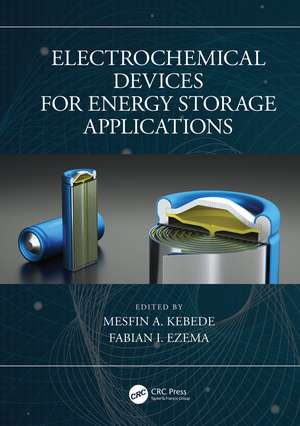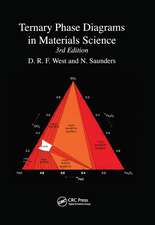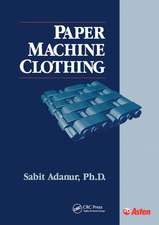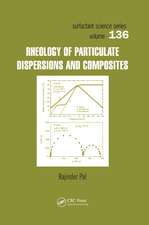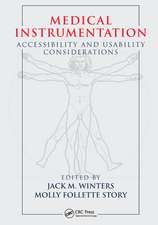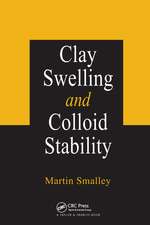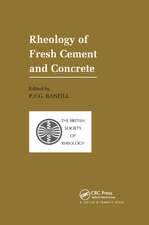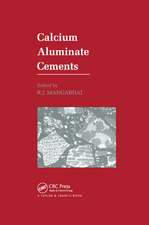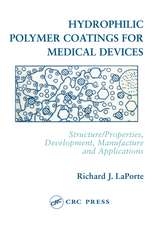Electrochemical Devices for Energy Storage Applications
Editat de Mesfin A. Kebede, Fabian I. Ezemaen Limba Engleză Hardback – 13 dec 2019
Features:
- Edited by established authorities in the field, with chapter contributions from subject area specialists
- Provides a comprehensive review of field
- Up to date with the latest developments and research
| Toate formatele și edițiile | Preț | Express |
|---|---|---|
| Paperback (1) | 437.28 lei 6-8 săpt. | |
| CRC Press – 30 sep 2021 | 437.28 lei 6-8 săpt. | |
| Hardback (1) | 1115.33 lei 6-8 săpt. | |
| CRC Press – 13 dec 2019 | 1115.33 lei 6-8 săpt. |
Preț: 1115.33 lei
Preț vechi: 1360.16 lei
-18% Nou
Puncte Express: 1673
Preț estimativ în valută:
213.42€ • 223.28$ • 177.29£
213.42€ • 223.28$ • 177.29£
Carte tipărită la comandă
Livrare economică 03-17 aprilie
Preluare comenzi: 021 569.72.76
Specificații
ISBN-13: 9780367425678
ISBN-10: 036742567X
Pagini: 266
Ilustrații: 222
Dimensiuni: 178 x 254 x 20 mm
Greutate: 0.63 kg
Ediția:1
Editura: CRC Press
Colecția CRC Press
ISBN-10: 036742567X
Pagini: 266
Ilustrații: 222
Dimensiuni: 178 x 254 x 20 mm
Greutate: 0.63 kg
Ediția:1
Editura: CRC Press
Colecția CRC Press
Public țintă
Postgraduate and ProfessionalCuprins
ContentsPreface ...................................................................................................................................................... vii
Editors ....................................................................................................................................................... ix
Contributors .............................................................................................................................................. xi
1. Layered, Spinel, Olivine, and Silicate as Cathode Materials for Lithium-Ion Battery ............. 1
Mesfin A. Kebede, Nithyadharseni Palaniyandy, and Lehlohonolo F. Koao
2. Metal Oxide-Based Anode Materials for Lithium-Ion Battery .................................................. 19
Mesfin A. Kebede and Nithyadharseni Palaniyandy
3. Sodium-Ion Battery Anode Materials and Its Future Prospects and Challenges .................... 41
Nithyadharseni Palaniyandy and Mesfin A. Kebede
4. Cathode Materials for Sodium-Ion-Based Energy Storage Batteries ....................................... 59
Assumpta C. Nwanya, Mesfin A. Kebede, Fabian I. Ezema, and M. Maaza
5. Magnesium Battery ........................................................................................................................ 81
E. Sheha
6. Graphene-Based Electrode Materials for Supercapacitor Applications ................................. 101
Moshawe J. Madito, Katlego Makgopa, Christopher B. Mtshali, and Abdulhakeem Bello
7. Transition Metal Oxide-Based Nanomaterials for High Energy and Power Density
Supercapacitor .............................................................................................................................. 131
Raphael M. Obodo, Assumpta C. Nwanya, Tabassum Hassina, Mesfin A. Kebede,
Ishaq Ahmad, M. Maaza, and Fabian I. Ezema
8. The Role of Modelling and Simulation in the Achievement of Next-Generation
Electrochemical Capacitors ......................................................................................................... 151
Innocent S. Ike, Iakovos J. Sigalas, Sunny E. Iyuke, and Egwu E. Kalu
9. Cerium Oxide: Synthesis, Structural, Morphology, and Applications
in Electrochemical Energy Devices ............................................................................................. 181
Ugochi K. Chime, M. Maaza, and Fabian I. Ezema
10. Multifunctional Energy Storage: Piezoelectric Self-charging Cell .......................................... 197
Blessing N. Ezealigo, M. Maaza, and Fabian I. Ezema
11. The Contributions of Electrolytes in Achieving the Performance Index
of Next-Generation Electrochemical Capacitors (ECs) ............................................................ 215
Innocent S. Ike, Iakovos J. Sigalas, Sunny E. Iyuke, and Egwu E. Kalu
Index ...................................................................................................................................................... 249
Editors ....................................................................................................................................................... ix
Contributors .............................................................................................................................................. xi
1. Layered, Spinel, Olivine, and Silicate as Cathode Materials for Lithium-Ion Battery ............. 1
Mesfin A. Kebede, Nithyadharseni Palaniyandy, and Lehlohonolo F. Koao
2. Metal Oxide-Based Anode Materials for Lithium-Ion Battery .................................................. 19
Mesfin A. Kebede and Nithyadharseni Palaniyandy
3. Sodium-Ion Battery Anode Materials and Its Future Prospects and Challenges .................... 41
Nithyadharseni Palaniyandy and Mesfin A. Kebede
4. Cathode Materials for Sodium-Ion-Based Energy Storage Batteries ....................................... 59
Assumpta C. Nwanya, Mesfin A. Kebede, Fabian I. Ezema, and M. Maaza
5. Magnesium Battery ........................................................................................................................ 81
E. Sheha
6. Graphene-Based Electrode Materials for Supercapacitor Applications ................................. 101
Moshawe J. Madito, Katlego Makgopa, Christopher B. Mtshali, and Abdulhakeem Bello
7. Transition Metal Oxide-Based Nanomaterials for High Energy and Power Density
Supercapacitor .............................................................................................................................. 131
Raphael M. Obodo, Assumpta C. Nwanya, Tabassum Hassina, Mesfin A. Kebede,
Ishaq Ahmad, M. Maaza, and Fabian I. Ezema
8. The Role of Modelling and Simulation in the Achievement of Next-Generation
Electrochemical Capacitors ......................................................................................................... 151
Innocent S. Ike, Iakovos J. Sigalas, Sunny E. Iyuke, and Egwu E. Kalu
9. Cerium Oxide: Synthesis, Structural, Morphology, and Applications
in Electrochemical Energy Devices ............................................................................................. 181
Ugochi K. Chime, M. Maaza, and Fabian I. Ezema
10. Multifunctional Energy Storage: Piezoelectric Self-charging Cell .......................................... 197
Blessing N. Ezealigo, M. Maaza, and Fabian I. Ezema
11. The Contributions of Electrolytes in Achieving the Performance Index
of Next-Generation Electrochemical Capacitors (ECs) ............................................................ 215
Innocent S. Ike, Iakovos J. Sigalas, Sunny E. Iyuke, and Egwu E. Kalu
Index ...................................................................................................................................................... 249
Notă biografică
Mesfin A. Kebede completed his PhD in Materials Science and Engineering from Inha University, South Korea, in 2009. He is currently a principal researcher at the Energy Centre, Council of Scientific and Industrial Research (CSIR), in South Africa. He has been studying and researching the properties and applications of nanostructured materials as electrodes for lithium-ion battery, gas sensors, luminescent and photoluminescence and photocatalysis for more than a decade. In his prior career, he worked as an assistant professor at Hawassa University, Ethiopia, where he supervised and mentored MSc and PhD students’ research projects. He has authored two book chapters and more than 50 papers in reputed journals with an h-index of 14 with over 590 citations and has served as reviewer for several high-impact journals and as an editorial board member.
Fabian I. Ezema is a professor at the University of Nigeria, Nsukka. He earned a PhD in Physics and Astronomy from the University of Nigeria, Nsukka. His research focused on several areas of Materials Science, from synthesis and characterizations of particles and thin-film materials through chemical routes with emphasis on energy applications. For the last 15 years, he has been working on energy conversion and storage (cathodes, anodes, supercapacitors, solar cells, among others), including novel methods of synthesis, characterization and evaluation of the electrochemical and optical properties. He has published about 180 papers in various international journals and given over 50 talks at various conferences. His h-index is 21 with over 1500 citations and he has served as reviewer for several high impact journals and as an editorial board member.
Fabian I. Ezema is a professor at the University of Nigeria, Nsukka. He earned a PhD in Physics and Astronomy from the University of Nigeria, Nsukka. His research focused on several areas of Materials Science, from synthesis and characterizations of particles and thin-film materials through chemical routes with emphasis on energy applications. For the last 15 years, he has been working on energy conversion and storage (cathodes, anodes, supercapacitors, solar cells, among others), including novel methods of synthesis, characterization and evaluation of the electrochemical and optical properties. He has published about 180 papers in various international journals and given over 50 talks at various conferences. His h-index is 21 with over 1500 citations and he has served as reviewer for several high impact journals and as an editorial board member.
Recenzii
"Environmentally concerned citizens generally believe that shifting the societal focus on automotive transportation to electric vehicles while meeting the lion’s share of energy demand from renewable resources can make a significant difference to mitigating adverse effects of global warming and climate change. But let’s be real. What is needed is a revolution in science and technology, not to mention related social engineering. And revolutions are difficult to launch and sustain.
So it is that this nearly unique volume of contributed papers on electrochemical devices for various energy storage scenarios using a multitude of different materials is a welcome addition. In eleven lean chapters, editors Kebede (Council of Scientific and Industrial Research, South Africa) and Ezema (Univ. of Nigeria), along with their authoring team, have addressed two essential themes: the first five chapters treat essential topics in lithium-ion, sodium-ion, and magnesium battery technology, while the other six address electrochemical (super)capacitor issues. Of particular interest are the treatments of energy density and graphene-based electrode materials for generating power from such devices. This work will be appreciated by preprofessionals and practitioners alike. Literature citations are current through 2018…The book is a worthwhile investment.
Summing Up: Recommended. Upper-division undergraduates. Graduate students, faculty, and professionals. Students in two-year technical programs.
— L. W. Fine, Columbia University in CHOICE June 2021 Vol. 58 No. 10"
So it is that this nearly unique volume of contributed papers on electrochemical devices for various energy storage scenarios using a multitude of different materials is a welcome addition. In eleven lean chapters, editors Kebede (Council of Scientific and Industrial Research, South Africa) and Ezema (Univ. of Nigeria), along with their authoring team, have addressed two essential themes: the first five chapters treat essential topics in lithium-ion, sodium-ion, and magnesium battery technology, while the other six address electrochemical (super)capacitor issues. Of particular interest are the treatments of energy density and graphene-based electrode materials for generating power from such devices. This work will be appreciated by preprofessionals and practitioners alike. Literature citations are current through 2018…The book is a worthwhile investment.
Summing Up: Recommended. Upper-division undergraduates. Graduate students, faculty, and professionals. Students in two-year technical programs.
— L. W. Fine, Columbia University in CHOICE June 2021 Vol. 58 No. 10"
Descriere
The aim of the book is to provide a comprehensive review of the devices of Li-ion, Na-ion, Mg-ion and supercapacitors and introduce the next-generation rechargeable batteries and supercapacitors. It will serve as a valuable reference for researchers working with energy storage technologies across the fields of physics, chemistry, and engineering.
